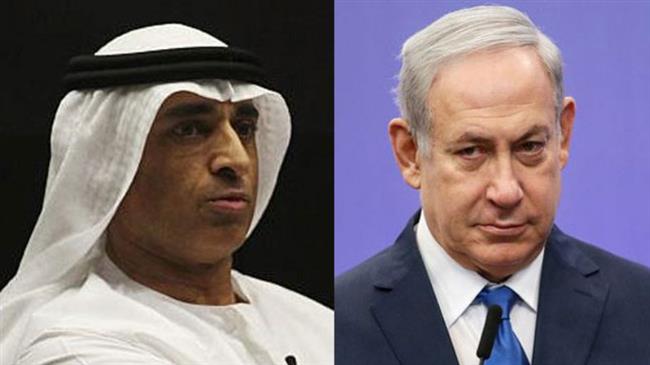
RNA - Netanyahu was in Washington to attend an annual pro-Israel policy conference, where he met the UAE's Yousef al Otaiba, and Bahrain’s Sheikh Abdullah bin Rashed bin Abdullah Al Khalifah, the report said.
According to the report, Otaiba and Sheikh Abdullah were having dinner with a US State Department official and others at a restaurant where they were made aware of Netanyahu's presence.
The Emirati ambassador then invited the Israeli prime minister and his wife, Sara, to join their table. "It wasn’t long before Netanyahu and his wife came over to say hello on their way out," the AP reported.
"They lingered, answering a few questions from the group about Iran and other issues. There were smiles, a few laughs about the oddity of the situation, and Netanyahu shook hands with the two ambassadors before leaving the restaurant," it said.
The meeting, the AP said, "sheds light on one of the worst kept secrets in the Arab world: the quiet ties between Israel and some of its Arab neighbors" which have been trying to sideline the Palestinian issue.
The interaction also casts light on how friendly cooperation between Israel and the Arab Persian Gulf nations, until recently kept behind the scenes, "are creeping into public view," it added.
The news agency, however, touched on the risks for the Arab leaders in pushing for an alliance with Israel.
"After all, Arab leaders have spent much of the past 70 years teaching their populations that Israel must not be allowed to exist and championing the cause of the Palestinians," it said.
The AP said while Israel and the US have sidelined the Palestinian issue, "these behind-the-scenes ties are likely to continue, and may be enough for Israel’s own strategic needs."
Last year, Israeli paper Ha’aretz revealed that Netanyahu had met with Otaiba and Emirati Foreign Minister Sheikh Abdullah bin Zayed Al Nahyan in New York back in 2012.
Similar reports have pointed to numerous contacts between Tel Aviv and Riyadh and its allies over the past decade.
Netanyahu frequently boasts of growing, discreet cooperation with some Arab countries. Though he doesn’t identify them by name, they’ve long been believed to be Persian Gulf states such as the UAE and Saudi Arabia.
The Saudis recently broke a decades-old practice and agreed to allow Indian flights to Israel to pass through their airspace, cutting the trip by several hours.
According to Press TV, the Saudi crown prince, Mohammad Bin Salman, even met with pro-Israel Jewish American leaders in his recent high-profile trip to the US, during which he was quoted as criticizing Palestinians.
Israeli businessmen quietly operate in the UAE and the Emirati Embassy in Washington is planning an interfaith Iftar — the meal eaten by Muslims to break the Ramadan fast — that will include a US rabbi.
Bahrain late last year sent a delegation to Israel and its foreign minister, Khalid bin Ahmed Al Khalifah, stunned Israelis and Arabs this past week when he tweeted support for Israeli airstrikes in Syria.
847/940